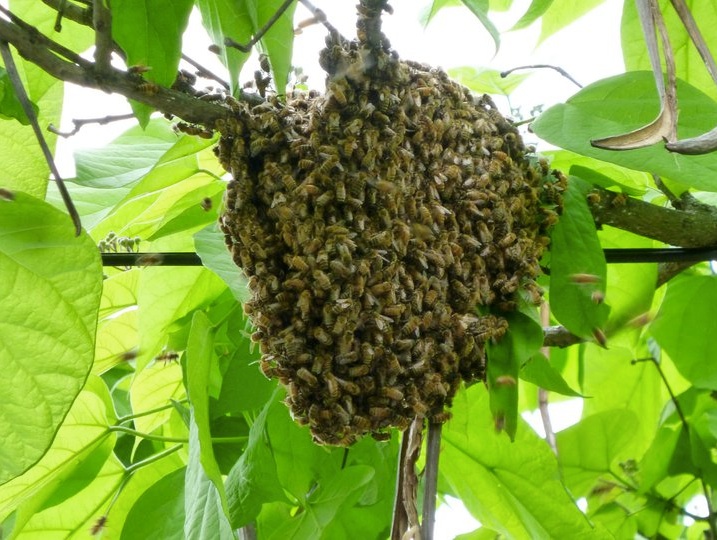The Last Days of Summer Before the First Frost
BY TIM BOWLING
The Last Days of Summer Before the First Frost
BY TIM BOWLING


Murphy doesn’t love bees. But he loves to go. He loves to go in the truck and hang his head out the window. Today, when I stopped for an iced tea and left Murph waiting in the truck, a small crowd of women gathered around them. When I returned with my iced tea, they were all snapping pictures.


Mother’s Day marks an exciting time for beekeeping in Ohio, Reader—it is now officially swarm season. So, if you’ve discovered a swarm of honeybees hanging in a tree or in a bush or on a lamppost or in some other unexpected place, please please please contact TwoHoneys. If your swarm is at all reachable, we’ll come right over and collect it (and if I can’t personally run right over, I know people who can).
We’ll then take your swarm to one of our bee yards where we’ll introduce it to a nice, dry, comfortable hive box where the bees will immediately begin to set up housekeeping and collecting nectar from our local flora.
In a time of unprecedented bee losses, Reader, the swarm you discover is the sign that something is right in the world. :) A swarm at this time of year indicates that a strong hive near you successfully overwintered in a snug location and has outgrown its space. The swarm you’ve discovered is the sign of a strong hive…I call it a “survivor hive.” And all smart beekeepers want local, survivor hives…these survivor genes are those we hope to propagate in order to develop hardy bees that can withstand Ohio winters and forage on Ohio flora.
A swarm is a gift to the world, Reader. And it has come to you. How wonderful is that?!
Ox Cart Man
BY DONALD HALL
In October of the year,
he counts potatoes dug from the brown field,
counting the seed, counting
the cellar’s portion out,
and bags the rest on the cart’s floor.
He packs wool sheared in April, honey
in combs, linen, leather
tanned from deerhide,
and vinegar in a barrel
hooped by hand at the forge’s fire.
He walks by his ox’s head, ten days
to Portsmouth Market, and sells potatoes,
and the bag that carried potatoes,
flaxseed, birch brooms, maple sugar, goose
feathers, yarn.
When the cart is empty he sells the cart.
When the cart is sold he sells the ox,
harness and yoke, and walks
home, his pockets heavy
with the year’s coin for salt and taxes,
and at home by fire’s light in November cold
stitches new harness
for next year’s ox in the barn,
and carves the yoke, and saws planks
building the cart again.
Beyond the Red River
BY THOMAS MCGRATH
The birds have flown their summer skies to the south,
And the flower-money is drying in the banks of bent grass
Which the bumble bee has abandoned. We wait for a winter lion,
Body of ice-crystals and sombrero of dead leaves.
A month ago, from the salt engines of the sea,
A machinery of early storms rolled toward the holiday houses
Where summer still dozed in the pool-side chairs, sipping
An aging whiskey of distances and departures.
Now the long freight of autumn goes smoking out of the land.
My possibles are all packed up, but still I do not leave.
I am happy enough here, where Dakota drifts wild in the universe,
Where the prairie is starting to shake in the surf of the winter dark.
More Than Enough
BY MARGE PIERCY
The first lily of June opens its red mouth.
All over the sand road where we walk
multiflora rose climbs trees cascading
white or pink blossoms, simple, intense
the scene drifting like colored mist.
The arrowhead is spreading its creamy
clumps of flower and the blackberries
are blooming in the thickets. Season of
joy for the bee. The green will never
again be so green, so purely and lushly
new, grass lifting its wheaty seedheads
into the wind. Rich fresh wine
of June, we stagger into you smeared
with pollen, overcome as the turtle
laying her eggs in roadside sand.
The Last Days of Summer Before the First Frost
BY TIM BOWLING
the bee trails turning to ice as they’re flown.
“Was you ever bit by a dead bee?”
BY HAILEY LEITHAUSER
I was, I was—by its posthumous chomp,
that I was, by the posthumous chomp
of an expired wire, you’ll bellow out prompt
at the pitiless shiv when she does what she does.
Was you? I was. By its posthumous chomp,
by its bad dab of venom, its joy-buzzer buzz.
A Song on the End of the World
BY CZESLAW MILOSZ
TRANSLATED BY ANTHONY MILOSZ
On the day the world ends
A bee circles a clover,
A fisherman mends a glimmering net.
Happy porpoises jump in the sea,
By the rainspout young sparrows are playing
And the snake is gold-skinned as it should always be.
On the day the world ends
Women walk through the fields under their umbrellas,
A drunkard grows sleepy at the edge of a lawn,
Vegetable peddlers shout in the street
And a yellow-sailed boat comes nearer the island,
The voice of a violin lasts in the air
And leads into a starry night.
And those who expected lightning and thunder
Are disappointed.
And those who expected signs and archangels’ trumps
Do not believe it is happening now.
As long as the sun and the moon are above,
As long as the bumblebee visits a rose,
As long as rosy infants are born
No one believes it is happening now.
Only a white-haired old man, who would be a prophet
Yet is not a prophet, for he’s much too busy,
Repeats while he binds his tomatoes:
There will be no other end of the world,
There will be no other end of the world.
Warsaw, 1944
Intimate Detail
BY Heid E. Erdrich
Late summer, late afternoon, my work
interrupted by bees who claim my tea,
even my pen looks flower-good to them.
I warn a delivery man that my bees,
who all summer have been tame as cows,
now grow frantic, aggressive, difficult to shoo
from the house. I blame the second blooms
come out in hot colors, defiant vibrancy—
unexpected from cottage cosmos, nicotianna,
and bean vine. But those bees know, I’m told
by the interested delivery man, they have only
so many days to go. He sighs at sweetness untasted.
Still warm in the day, we inspect the bees.
This kind stranger knows them in intimate detail.
He can name the ones I think of as shopping ladies.
Their fur coats ruffed up, yellow packages tucked
beneath their wings, so weighted with their finds
they ascend in slow circles, sometimes drop, while
other bees whirl madly, dance the blossoms, ravish
broadly so the whole bed bends and bounces alive.
He asks if I have kids, I say not yet. He has five,
all boys. He calls the honeybees his girls although
he tells me they’re ungendered workers
who never produce offspring. Some hour drops,
the bees shut off. In the long, cool slant of sun,
spent flowers fold into cups. He asks me if I’ve ever
seen a Solitary Bee where it sleeps. I say I’ve not.
The nearest bud’s a long-throated peach hollyhock.
He cradles it in his palm, holds it up so I spy
the intimacy of the sleeping bee. Little life safe in a petal,
little girl, your few furious buzzings as you stir
stay with me all winter, remind me of my work undone.
